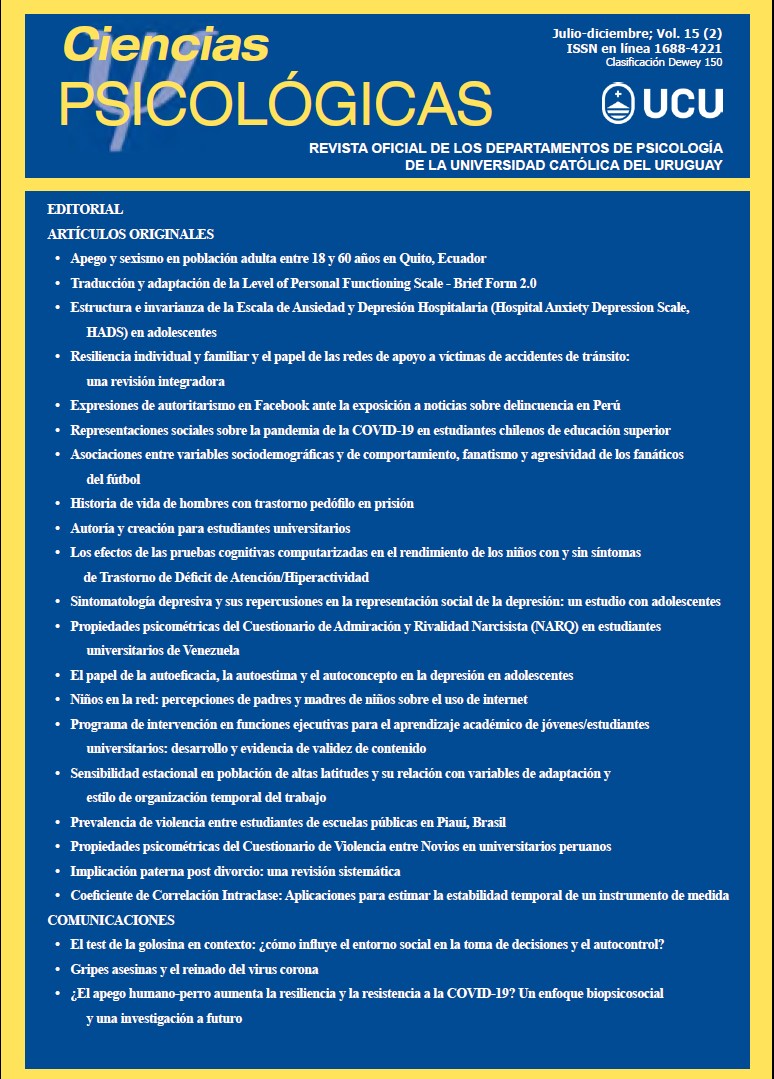Social representations about the COVID-19 pandemic of Chilean higher education students
DOI:
https://doi.org/10.22235/cp.v15i2.2280Keywords:
COVID-19, pandemic, social representations, structural model, health psychologyAbstract
The COVID 19 has caused multiple effects on the physical and mental health of the world’s population. From the psychosocial perspective, this study proposes to understand the social representations about the COVID-19 pandemic of Chilean higher education students. The participants were a total of 92 Chilean higher education students. Data collection was carried out using a questionnaire of social representations, which included the following stimulus words: (a) COVID-19, (b) quarantine, and (c) social distancing. The data were analyzed using natural semantic network analysis. The results showed that the thematic categories of the COVID-19 are mainly related to biological, emotional and value aspects. For quarantine and social distancing, thematic categories are related to emotional and value aspects. The results are discussed based on the understanding of the categories of thought that promote behavior in the context of a health emergency.
Downloads
References
Acevedo, I. (2002). Aspectos éticos en la investigación científica. Ciencia y Enfermería, 8(1), 15-18. doi: https://doi.org//10.4067/S0717-95532002000100003
Caniuqueo, A., Hernández-Mosqueira, C., Troyano, A. Riquelme, D., Vargas, A., Vargas, R. & Fernandes, J. (2018). Representaciones sociales: el significado de la educación física para los estudiantes de esa disciplina. Revista Electrónica de Investigación Educativa, 20(1), 104-111. doi: https://doi.org/10.24320/redie.2018.20.1.1497
Carrasquilla, D., González, G., Camargo, D., Soto, N., & Ramos, E. (2019). Representaciones sociales de salud, enfermedad y cuidado cultural en músicos tradicionales. Revista Cubana De Enfermería, 35(1).
Castañeda, A. (2016). Las redes semánticas naturales como estrategia metodológica para conocer las representaciones sociales acerca de la investigación en el contexto de la formación profesional de los comunicadores. Estudios sobre las Culturas Contemporáneas, XXII(43), 123-168.
Conejo, L., Chaverri-Chaves, P., & León-González, S. (2020). Las familias y la pandemia del COVID-19. Revista Electrónica Educare, 24(Suplemento), 37-40. doi: http://dx.doi.org/10.15359/ree.24-s.10
Guzmán, M. O., Guzmán, M. A. O., & Guzmán, M. G. O. (2011). Representación infantil de la influenza A, a través de un dibujo a tema. Psicologia para América Latina, (22), 1-13.
Hinojosa, G. (2008). El tratamiento estadístico de las redes semánticas naturales. Revista Internacional de Ciencias Sociales y Humanidades, SOCIOTAM, XVIII(1), 133-154.
Höijer, B. (2011). Social Representations Theory. Nordicom Review, 32(2), 3-16. doi: https://doi.org/10.1515/nor-2017-0109
Jodelet, D. (1986). La representación social: fenómenos, concepto y teoría. En S. Moscovici (Ed.), Psicología social II. Pensamiento y vida social (pp. 469-493). Barcelona, España: Editorial Paidós.
Johnson M. C., Saletti-Cuesta L., & Tumas, N. (2020). Emociones, preocupaciones y reflexiones frente a la pandemia del COVID-19 en Argentina. Ciência & Saúde Coletiva, 25(Suppl. 1), 2447-2456. doi: https://doi.org/10.1590/1413-81232020256.1.10472020
Lin, Y., Huang, L., Nie, S., Liu, Z., Yu, H., Yan, W., & Xu, Y. (2011). Knowledge, Attitudes and Practices (KAP) related to the Pandemic (H1N1) 2009 among Chinese General Population: a Telephone Survey. BMC Infect Dis 11, 128. doi: https://doi.org/10.1186/1471-2334-11-128
Marková, I. (2017). The making of the theory of social representations. Cadernos de Pesquisa, 47(163), 358-375. doi: https://doi.org/10.1590/198053143760
Organización Mundial de la Salud [OMS] (s.f.). Alerta y Respuesta Mundiales (GAR). Recuperado de https://www.who.int/csr/disease/swineflu/frequently_asked_questions/pandemic/es/
Páez, D. & Pérez, J. (2020). Social representations of COVID-19. International Journal of Social Psychology, 35(3), 600-610. doi: https://doi.org/10.1080/02134748.2020.1783852
Pérez, C. (2020). Actitudes frecuentes en una población de Alamar ante la COVID 19 en tiempo real. Revista Habanera de Ciencias Médicas, 19(5), e3411.
Rateau, P., & Lo Monaco, G. (2013). La Teoría de las Representaciones Sociales: Orientaciones conceptuales, campos de aplicaciones y método. CES Psicología, 6(1), 22-42.
Rodríguez, G., Gil J., & García, E. (1999). Metodología de la investigación cualitativa. España: Ediciones Aljibe.
Roy, D., Tripathy, S., Kar, S. K., Sharma, N., Verma, S. K., & Kaushal, V. (2020). Study of knowledge, attitude, anxiety & perceived mental healthcare need in Indian population during COVID-19 pandemic. Asian journal of psychiatry, 51, 102083. doi: https://doi.org/10.1016/j.ajp.2020.102083
Rubira-García, R., & Puebla-Martínez, B. (2018). Representaciones sociales y comunicación: apuntes teóricos para un diálogo interdisciplinar inconcluso. Convergencia, 25(76), 147-167. doi: https://doi.org/10.29101/crcs.v25i76.4590
Torres-López, T. M., Matsui, O. J., & Aranda, C. (2012). Dimensiones culturales del concepto de influenza humana en estudiantes y docentes de ciencias de la salud que favorecen o dificultan su prevención. Desacatos, (39), 45-56.
Torres-López, T. M., Núñez-Sandoval, Y. C., & De la Cruz-Villarreal, A. (2017). Representaciones sociales de la influenza humana de adolescentes de la ciudad de Guadalajara, México. Actualidades en Psicología, 31(122), 17-30. doi: https://doi.org/10.15517/ap.v31i122.24578
Urzúa, A., Vera-Villarroel, P., Caqueo-Urízar, A., & Polanco-Carrasco, R. (2020). La Psicología en la prevención y manejo del COVID-19. Aportes desde la evidencia inicial. Terapia psicológica, 38(1), 103-118. doi: https://doi.org/10.4067/S0718-48082020000100103
Vergara, M. C. (2008). La naturaleza de las representaciones sociales. Revista Latinoamericana de Ciencias Sociales, Niñez y Juventud, 6(1), 55-80.
Downloads
Published
How to Cite
Issue
Section
License
Copyright (c) 2021 Universidad Católica del Uruguay

This work is licensed under a Creative Commons Attribution 4.0 International License.
















